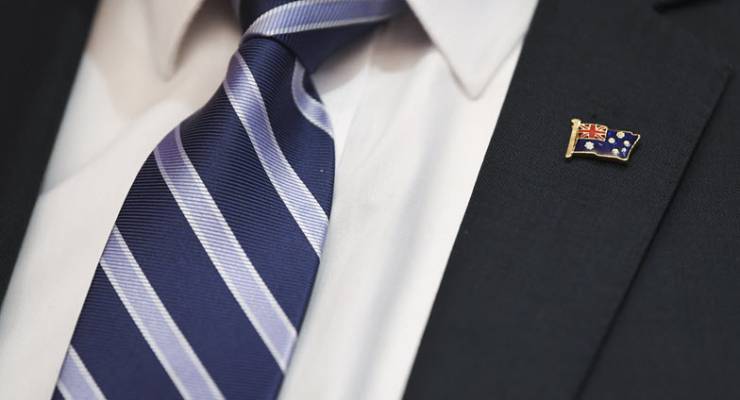
For each of you today, I gave you a lapel pin with the Australian flag on it. I’ve been wearing this now for many, many years. I can’t remember when I started doing this. The reason I wear it is because it reminds me every single day whose side I’m on. I’m on the stride [sic] of the Australian people, that’s what I’m saying to myself, that’s who I think about first… I gave that to you as a reminder today of how I remind myself.
Scott Morrison to cabinet, August 28 2018
We all need aides-memoire in our professional lives; the to-do list, the Outlook reminder and the phone alarm are indispensable parts of our working day. Scott Morrison, in the demanding position of senior minister and now as Prime Minister, doubtless needs them as much as anyone. And even more so, judging by his comments yesterday, for he has seemingly long struggled with remembering not merely which meeting he has at 2pm, but for whom he works. Or, more accurately, whose side he is on — an interesting distinction, possibly without a difference.
A lapel pin, a tiny Australian flag, is now his aide memoire that he is on the side of the Australian people. So crucial is this device to remember that he can’t remember when he first needed it to remember.
So now all must remember to wear the lapel pin, at least in the presence of Morrison; we await #lapelwatch to see which minister will not (per Kramer’s tormentor in Seinfeld). Although this is not, technically, a reminder of which side they are on, but a reminder of how Morrison reminds himself, an aide memoire for an aide memoire, as it were. How modern is that? Such is memory in the age of Google; now we have to remember how to remember; the act of remembering itself is left to the internet, just as it was once left to clay tablets, then paper, then printing presses. If Malcolm Turnbull invented the internet here, ScoMo, as he styles himself, is a product of it.
Morrison seems curiously anxious about assuring voters he is on their side — such were the first prime ministerial words from him. After last week, when a self-indulgent rabble behaved in a way that demonstrated the last people whose side they were on were voters, it bespeaks a guilty conscience, if not guilty consciousness. The insistence on memory, and forgetfulness, and remembering to remember, and not being able to remember when you didn’t need something to remember would, if we paged Dr Freud, yield rich pickings about the collective mindset of an addled, deeply insular party.
Sometimes a lapel pin is just a lapel pin, of course. Other times it must carry a weight far in excess of what such a tiny, tinny object should bear. Ask the Republicans and their media lapdogs in the US. A decade ago, presidential aspirant Barack Obama was criticised for not wearing a US flag lapel pin. Indeed, after he became president, an entire collection of lies were spread about Obama’s lack of deference to (often invented) patriotic symbols.
“Shortly after 9/11, particularly because as we’re talking about the Iraq war, that became a substitute for I think true patriotism, which is speaking out on issues that are of importance to our national security,” he said, later adding, “I’m less concerned about what you’re wearing on your lapel than what’s in your heart. You show your patriotism by how you treat your fellow Americans, especially those who serve.”
That is, lapel pins are not about what the wearer wants to remember, but what they want others to forget. Actions that ill-serve the voters whose side they are supposedly on. The poor treatment of their fellow-citizens. And most of all, the hollow politician behind the shiny badge. After last week, a number of ministers should be careful not to push the pins in too far. They might pierce themselves and fly about crazily until they collapse, deflated, in a corner of the cabinet room.








A vomit inducing little bit of theatrics for the cameras from the shire shyster.
“Be alert, but not alarmed”, fridge magnets will be next – if form means anything.
“Where the bloody are the voters?”
…bloody hell…
“VIVA stagnant wages and unaffordable homes!”
I think he has taken on himself the sobriquet the grand wanker. “Patriotism the last refuge of the scoundrel”
I prefer Ambrose Bierce’s definition:
>Patriotism, n. Combustible rubbish ready to the torch of any one ambitious to illuminate his name. In Dr. Johnson’s famous dictionary patriotism is defined as the last resort of a scoundrel. With all due respect to an enlightened but inferior lexicographer I beg to submit it is the first.
If PM ScoMo needs a lapel pin to remind him who’s side he is on … he is definitely in the wrong profession, let alone totally wrong job. Voting 26 times against the Banking Royal Commission… must have forgot to wear the Aussie people lapel those days.
Gee, I didn’t realise that the likes of Rio Tinto, BHP, News Corpse & Google were “The Australian People”…….because those are the only punters this government has been working for these past 5 years.
Jeff Kennett used to have those map of Victoria lapel pins- mandatory for government MPs, senior bureaucrats etc. Low level nazism which made him even more of a laughing stock amongst those with an IQ above 26. Didn’t seem to help him electorally.